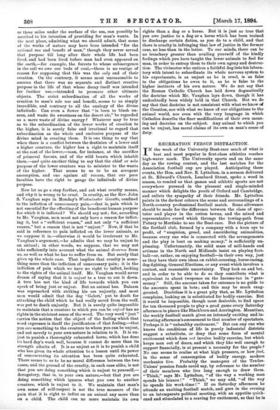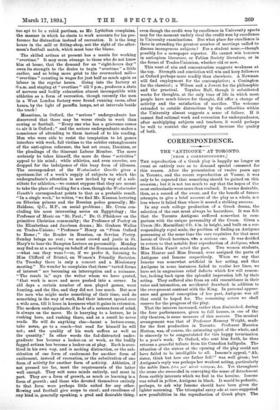RECREATION VERSUS DISTRACTION.
TN the week of the University Boat-race much of what is best and most popular in first-class athletics reaches high-water mark. The University sports end on the same day as the rowing contest, and the last matches for the Association football cup are played. Anticipating these events, the Hon. and Rev. E. Lyttelton, in a sermon delivered at St. Edward's Church, Lombard Street, spoke a word in season, to remind us that games and athletic sports are not everywhere pursued in the pleasant and single-minded manner which delights the youth of Oxford and Cambridge, and enlists the sympathy of their friends. Mr. Lyttelton paints in the darkest colours the scene and surroundings of a North-country professional football match. Some allowance should be made for the difference between the class of spec- tator and player in the cotton towns, and the mixed and representative crowd which throngs the towing-path from Putney to Mortlake to see the Boat-race. But the picture of the football club, formed by a company with a keen eye to profit, of "suspicion, greed, and smouldering animosities, because every one who is connected with the arrangements and the play is bent on making money," is sufficiently un- pleasing. Unfortunately, the solid mass of mill-hands and artisans in the North and Midlands insist on playing foot- ball—or, rather, on enjoying football—in their own way, just as they have their own ideas on rabbit-coursing, horse-racing, dog-fighting, General Elections, or any event which involves a contest, and reasonable uncertainty. They look on and bet, and in order to be able to do so they contribute what is equivalent to about twopence on the Income-tax in " gate- money." Still, the amount taken for entrance is no guide to the amounts spent in bets ; and this may be much exag- gerated. Doubtless it is a great pity that, as Mr. Lyttelton complains, looking on is substituted for bodily exercise. But it would be impossible, though most desirable, to find space for ten thousand people to play a good game every Saturday afternoon in places like Blackburn and Accrington. Meantime, the weekly football match gives an intensely exciting and in- teresting afternoon's amusement to that number of spectators. Perhaps it is " unhealthy excitement." But can any one who knows the conditions of life in purely industrial districts suggest a substitute, or deny that some form of mental excitement which does not involve bodily exercise, but which keeps men out of doors, and which they like well enough to support financially, is at present a necessity for the people ? No one seems to realise at what high pressure, or how fast, in the sense of consumption of bodily energy, modern mechanics live. Probably the managers of the Trades. Unions' pension funds could say, by reference to the number of their members who live long enough to draw them. " Think," says Mr. Lyttelton, " of the way a working man spends his leisure !" "Think," we may add, "of the way he spends his work-time !" If on Saturday afternoon he attends an exciting football match, and goes in the evening to an intemperate political meeting, with an appetite quick- ened and stimulated to a craving for excitement, so that he is
'too apt to be a rabid partisan, as Mr. Lyttelton complains, the manner in which he elects to work accounts for his pre- ference for distraction instead of recreation. It is the long hours in the mill or fitting-shop, not the sight of the after- coon's football match, which must bear the blame.
The skilled artisan at present has a mania for working "overtime." It may seem strange to those who do not know him at home, that the demand for an "eight-hours day" owes its strength to the desire to begin " overtime " a little earlier, and so bring more grist to the overworked mill- " overtime " counting in wages for just half as much again as labour in the regular hours. Going into the factory at .6 a.m. and staying at " overtime " till 9 p.m., produces a state of nervous and bodily exhaustion almost incompatible with athletics as a form of recreation, though recently the men in a West London factory were found running races, after hours, by the light of paraffin lamps, set at intervals beside the track !
Meantime, in Oxford, the " serious " undergraduate has discovered that there may be worse rivals to work than cowing or football. "Every one who has a grievance comes to air it in Oxford ; " and the serious undergraduate makes a conscience of attending to them instead of to his reading. Men who were able to resist the temptation to let games interfere with work, fall victims to the subtler entanglements of the anti-opium reformer, the last art craze, Ibsenism, or the pleadings of the itinerant Labour Member. The more seriously be takes himself, the more do these " activities " appeal to his mind ; while athletics, and even exercise, are dropped for the indulgence of this busy form of idleness. The correspondent of the Westminster Gazette gives a specimen-list of a week's supply of subjects to which the undergraduate's attention is now invited by way of a sub- stitute for athletics,—we cannot suppose that they are meant to take the place of reading for a class, though the Westminster Gazette's correspondent points to that as a probable result. "In a single week," he writes, "we find Mr. Kerman lecturing on Siberian prisons and the Russian police generally; Mr. Haldane, Q.C., M.P., on social problems ; Mr. Crum con- cluding his most interesting series on Egyptology ; the Professor of Music on "St. Paul;" Dr. O. Pfleiderer on the primitive Christian community; the Professor of Poetry on the Elizabethan and Jacobean drama ; Mr. Graham Wallas on Trades-Unions; "Professor" Henry on "From Oxford to Rome ; " the Reader in Russian, on Servian Poetry. Sunday brings no rest ; we must crowd and jostle in St. Mary's to hear the Bampton Lecture on personality. Monday may find us at a meeting on behalf of the Roumanian students —what can they want P—or, if we prefer it, listening to Miss Clifford of Bristol, on Women's Friendly Societies. On Tuesday there is only a concert and a Missionary meeting." No wonder he complains that these " varied forms of interest" are becoming an interruption and a nuisance. " The result is," says the writer whom we have quoted, "that work is more and more pushed into a corner. In old days a certain number of men played games, went hunting, and the like, and they did not lose much. But now the men who might make something of their time, and do something in the way of work, find their interest spread over a wide area, till it loses in keenness what it gains in extension. The modern undergraduate, if he be of a serious turn of mind, is always on the move. He is hurrying to a lecture, he is rushing here, and rushing there, and as a result he never reads. He will do anything else—haunt a lecture-room, take notes, go to a coach—but read for himself he will not ; and the quality of his work suffers as well as
the quantity." In other words the fad-distracted under- graduate has become a looker-on at work, as the bodily fagged artisan has become a looker-on at play. Each is over- tired in his own way, and is seeking distraction, or the sub- stitution of one form of excitement for another form of excitement, instead of recreation, or the substitution of one form of activity for another form of activity. Athletics, if not pressed too far, meet the requirements of the latter well enough. They suit some minds entirely, and most in part. They are a form of growth, as much as learning is a form of growth ; and those who devoted themselves entirely to that form were perhaps little suited for any other.
Rowing and football give scope to excel ; and excellence of any kind is, generally speaking, a good and desirable thing, even though the credit won by excellence in University sports may for the moment unduly rival the credit won by excellence in University examinations. But what place for excellence is there in attending the greatest number of meetings called to discuss incongruous subjects P For a student none,—though possibly for a newspaper reporter. He cannot win honours. in anti-opium literature, or Fabian Society literature, or in the forms of Trades•Unionism, whether old or new.
This want of aim and concentration suggests weakness at the top. Strength and conviction will win and keep followers at Oxford perhaps more readily than elsewhere. A Newman will find employment for the contemplative; a Conington for the classical ; a Wilson and a Jowett for the philosophic and the practical. Toynbee Hall, though it substituted works for thoughts, at the only time of life in which most people have much leisure for thought, did offer a change of activity and the satisfaction of sacrifice. The welcome extended to outside distractions by the authorities within the University almost suggests a sense of failure. If it cannot find rational work and recreation for undergraduates, after multiplying subjects and teachers, it would perhaps be well to restrict the quantity and increase the quality of both.



































 Previous page
Previous page